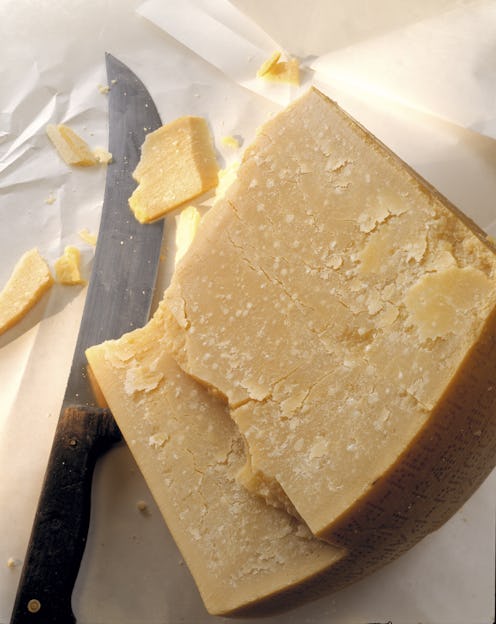Life
PSA: Parmesan Cheese Isn't Vegetarian

Whether shaved on top of a heaping bowl of pesto or eaten by the block, Parmigiano-Reggiano, the sharp, nutty, oh so flavorful Italian import is a delicious addition to any meal — unfortunately for vegetarians, it's off-limits. That's right: Parmesan cheese is not vegetarian as one of it's necessary ingredients is calf rennet. This shocking information is not a dark secret kept hidden from us by "Big Parma" — it's, actually, a little publicized fact about Parmigiano-Reggiano that is finally getting its time in the spotlight. As the food industry becomes more accommodating when it comes to dietary restrictions and preferences, we will be less and less likely to see dishes with certain popular European cheeses miss-marked vegetarian. So dear Veggies, prepare for heartbreak.
True Parmesan cheese is only made from three ingredients: fresh milk produced in the Parma/Reggio region of Italy, salt, and rennet, a milk coagulation agent that helps separate the curds from the whey. The rennet contains the active enzyme chymosin, which is extracted the lining of a calf's stomach. Though vegetarian rennet can be produced from vegetables, yeast, and fungus, due to Parmigiano-Reggiano's Protected Designation of Origin status, the hard cheese must be made using traditional processes, and the calf rennet cannot be omitted.
How the ingredient vital to old-world cheesemaking is produced may be particularly upsetting to those who avoid animal products. "Rennet can be sourced from the abomasum (fourth stomach) of newly-born calves where the chymosin aids digestion and absorption of milk," explains the Vegetarian Society. "Adult cows do not have this enzyme." Rennet can also be extracted from young lambs and goats — the thought of which is enough to put some off the crumbly cheese for good.
But it isn't just Parmesan alone that uses animal rennet to activate the cheesemaking process. Other popular hard and soft cheeses such as Grana Padano and Gorgonzola are made using animal rennet, as is Gruyere, Manchego, Pecorino Romano, Camembert, and Boucheron. So before you dig into that fancy cheese plate at the office Christmas party, you may want to take a second to think about just exactly what it is you are spreading on that water cracker. (Then feel free to shake your fist at the sky in hunger and rage.)
For many vegetarians, cheese is one of the highlights of the meat-free diet — an animal product with so many diverse applications and forms, with hundreds of years of history behind it. Recent research even suggests that cheese can be addictive, producing a similar high to opioids. Thankfully, there are vegetarian alternatives available for those seeking a gooey fix, you just need to know where to look. Next time you are perusing your local supermarket or cheesemonger take a second to decode the cheese's label; if you see the word "enzymes" listed under the ingredients, buyer beware. Cream cheese, small-curd cottage cheese, Paneer, and ricotta rely on heat, cultures, or acid (such as lemon juice) to aid the coagulating processes, but to be sure you're getting a vegetarian cheddar, only buy those that specify the source of the rennet or "enzymes" on the label.
*The more you know!
Images: Getty Images (2); Giphy